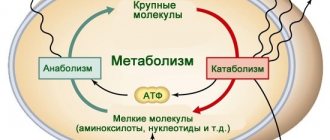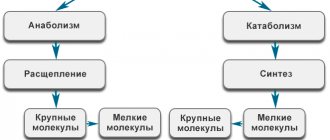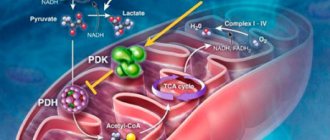How metabolism works in the human body, how to speed up metabolism and what affects it.
Surely, around each of us there are several people who have breakfast with croissants, lunch with French fries and dinner with pizza. And they don’t care about anything: they remain slim without much effort and grueling workouts in the gym. While others, on the contrary, cannot afford excesses and quickly gain extra pounds.
Why is this happening? The “culprit” is our metabolism or metabolism, which is individual for each of us, but it can and should be taken under control.
In simple words - about metabolism
Our body is a kind of “chemical laboratory” in which continuous numerous reactions occur every second to maintain life - something breaks down, something is synthesized. The processes begin from the moment nutrients enter the body and continue until their final products are released into the external environment.
There are:
* catabolism : complex compounds are broken down into simpler substances - energy is released;
* anabolism : complex structures are formed from simple compounds (elements of cells and tissues are built) - energy is expended.
Metabolism is influenced by several factors:
* if a person has more muscles, the metabolism is higher, if a person has a predominance of adipose tissue, it is lower;
* the older a person gets, the more metabolism slows down, especially after 50 years;
* food thermogenesis - energy spent by the body on the absorption/digestion/assimilation of food (10% of all daily costs);
* men's metabolism is 10% higher than women's;
* physical activity: the number of calories spent daily on any activity (walking, sleeping, playing sports, etc.).

Remedies to speed up slow metabolism
What to do when you have a slow metabolism? Are there any means to speed it up? If yes, which ones? Medications, nutritional supplements, natural remedies, proper nutrition and regular physical activity can all be helpful in combating a slow metabolism.
Herbal medicine to speed up metabolism:
- Green tea: rich in antioxidants and lipolytic compounds (able to break down fat); green tea increases the consumption of adipose tissue with the same physical activity; this leads to a decrease in body weight and excess weight, which cause a slowdown in metabolism;
- Fucus algae: acts as a “source of iodine”, important for the full functioning of the thyroid gland, the hormones of which stimulate metabolism through the induction of processes such as lipolysis (the body more actively uses fatty acids present in adipose tissue), degradation of complex carbohydrates such as glycogen into glucose, increasing contractility and heart rate, improving absorption of substances, stimulating and releasing hormones such as growth hormone;
- Ginseng: Due to its antidepressant properties, it is very useful in treating symptoms associated with a slow metabolism, such as asthenia and low blood pressure.
Of the medications, anorexigenic drugs are most often used, especially for those people who need to dramatically reduce body weight. These medications increase blood pressure, contractility and heart rate, stimulate metabolism, and affect the hunger control center in the hypothalamus, providing a feeling of fullness.
However, such drugs have many side effects: tachycardia, arrhythmia, stroke, high blood pressure, anxiety, depression, insomnia.
Nutrition and diet to speed up metabolism
First of all, it is recommended to follow a protein-based diet , since they are metabolized much more slowly than carbohydrates.

At the same time, I’m not saying that you should give up carbohydrates, it’s just that, in the case of a slow metabolism, it’s better to pay more attention to protein foods (meat, milk and dairy products, eggs, soybeans, fish, nuts, legumes, cereals), and minimize foods containing carbohydrates (bread, pasta, sweets).
chili peppers and sweet peppers has also been shown to be effective in stimulating metabolism, as consumption of these foods is associated with increased cardiac activity.
Small snacks throughout the day , such as mid-morning and mid-afternoon, are also recommended This speeds up metabolism, since in this case the body does not try to save energy.
Sports and muscle mass for metabolism
As we saw earlier, a sedentary lifestyle can cause a slower metabolism. In fact, the most important element in stimulating metabolism is vigorous physical activity .
When you exercise, your body actively consumes energy, which it gets from fatty acids stored in adipose tissue. With the help of exercises, you will remove excess fat mass, replacing it with muscle mass. This, in turn, will lead to a reduction in body weight and thus help counteract possible excess weight and slow metabolism.
It is recommended to do at least half an hour of brisk walking a day to maintain or speed up your metabolism. In addition, good muscle tone allows you to burn calories even at rest.
Metabolic "flexibility" and "rigidity"
The “fuel” or energy sources for our body are carbohydrates, fats and proteins. A healthy body must be able to use all sources of energy. However, this does not always happen, which leads to a tendency to gain excess weight and increase the risk of developing certain diseases.
Good metabolic “flexibility” - the ability to easily switch from one energy source to another (from carbohydrates to fats and vice versa)
It is easy to take breaks between meals for 5-6 hours or more - the body uses previously accumulated fats as an energy source. There's nothing to worry about. Periodically eating “bad” food does not become a problem - fats are burned quite quickly and converted into energy.
Weak metabolic flexibility or “rigidity” - the inability or limitation of the ability to switch from one type of energy to another
It is impossible or extremely difficult to spend more than 2-3 hours without food. Every time the blood sugar level drops, a person feels hungry (even if he has recently eaten heavily), he becomes lethargic and tired, and his brain function worsens. The ability to burn fat is reduced, and carbohydrates and fats, on the contrary, accumulate. Weight loss is difficult, and the risk of developing obesity and type II diabetes is increased.
Insulin is a “switch” from one type of “fuel” to another
Insulin is a hormone of the pancreas that is released into the blood when eating any food. The effect of the hormone is multifaceted. However, its main function is to ensure the penetration of glucose into the cell - it increases the permeability of the cell wall.
When insulin levels are low, fats are burned (leave fat cells) and converted into energy (metabolism accelerates), and cell sensitivity to insulin is good.
With increased levels of the hormone, metabolism slows down and shifts towards carbohydrates, fats accumulate, and cells are less sensitive to insulin.
So, is it possible to change the situation towards good metabolic “flexibility” and increase the sensitivity of the cell wall to insulin? It turns out, yes, by gradually increasing the intervals between meals - intermittent fasting or eating according to the “food window” principle.
|
Genetics (body type) and metabolism
There are 3 body types:
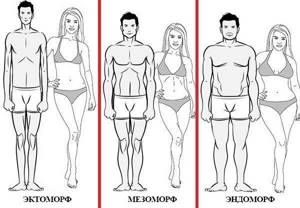
- ectomorph (fast, lean, energetic)
- mesomorph (muscular, average)
- endomorph (wide, slow, plump)
Ectomorphs (both men and girls/women) have the highest metabolism.
The metabolism of endomorphs (fat people) is the worst. Average type = mesomorph. That's it in a nutshell.
The main article on this topic (about body types) is here: “3 body types.”
Metabolism under conditions of hunger
The mechanism has been studied thoroughly and laid out on the “shelves”. The main task of the body in conditions of hunger is to provide our cells with energy taken from internal reserves (previously accumulated): carbohydrates and fats (to a greater extent) and proteins (rarely) are used.
Carbohydrates
Every day our body requires about 200 g of glucose; in conditions of hunger, the need decreases to 130 g.
Internal reserves of carbohydrates are used up quite quickly, so the body sends them to tissues that work only on glucose (for example, nervous tissue, red blood cells and some kidney cells). The main source of glucose becomes glycogen - previously accumulated glucose residues deposited in the liver and muscles.
Other organs are supplied with energy mainly through the use of internal reserves of fats (to a greater extent) and proteins (to a lesser extent).

Fats
When hunger sets in, fats begin to break down, forming ketones, which are used as fuel, triggering a cascade of reactions. What's going on?
Throughout life, each cell accumulates “garbage”: stale non-functioning proteins, amino acids and fragments of intracellular structures - clutter up and prevent the cell from working.
Ketones, entering the cell, signal the body that hunger has set in: the cell begins to use previously unclaimed substances for its vital functions, while simultaneously getting rid of previously accumulated “junk”.
Squirrels
They are used by the body extremely rarely - only in extreme conditions.
Emotional state and metabolism
Even what your mood is, how you feel (good or bad, depressed, etc.) = plays a role.
For example, stress leads to an increase in the level of the hormone cortisol, which worsens metabolism.

In general, avoid nervousness, stress, anxiety, depression and other conditions as much as possible.
And so, let's finally talk about how to maintain a stable, good metabolism.
Recommendation #2. Regular physical activity in general (be active/active)
Active people (who are active) have a much higher metabolic rate compared to people who are inactive.
There is an expression: “movement is life.” It doesn't exist for nothing =)

Don't sit in one place all day. Move more - move - move.
Dance, walk, run, jump, swim, rollerblade/cycle, d-v-i-g-a-y-s-i.
Any activity, in any case, is better = than nothing (nothing at all). It is important!
In addition, movement helps to burn calories (obtained from food), thereby preventing the accumulation of excess fat = as a consequence = the occurrence of health problems.

Remember 2 rules:
- You consume more calories = than you expend = you gain weight (get fat) (this is not in your interests)
- You spend more kcal = than you take in = you lose weight (weight does not increase). (it's in your best interest)
Therefore, any training, any physical activity is only in your interests, because they allow you to effectively spend ENERGY (CALORIES).
Recommendation No. 3.2. Drink enough water

Under conditions of dehydration, metabolism slows down in order to retain as much valuable fluid as possible and reduce its loss.
For this reason = dehydration and lack of water should not be allowed.
I recommend that you study the main article: “How much water should you drink per day.”

By the way. Tea, coffee and many carbonated drinks dehydrate the body, so avoid them.
What I mean is that, ideally, stop drinking all this nonsense (especially carbonated drinks, get rid of them right away / or very much limit them to a minimum, the same tea/coffee) = and drink only plain non-carbonated water.
Recommendation No. 3.1. accounting of calories (absorbed food).
Reduce your caloric intake as you get older (age) to minimize the accumulation of excess fat (avoid weight gain) and therefore avoid serious health/appearance problems.
Reduce the number of calories if physical activity is not planned during the day (or little) so that excess kcal does not come out, i.e. so that fat is not deposited on the body.
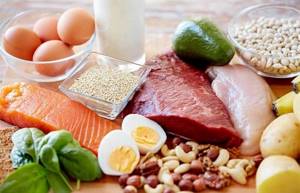
In general, watch the food you eat. For its quality (I talked above), but the quantity of this food = this is your part = you know better.
Remember those 2 rules that I already told you about:
- You consume more calories = than you expend = you gain weight (get fat) (this is not in your interests)
- You spend more kcal = than you take in = you lose weight (weight does not increase). (it's in your best interest)
Recommendation #4. Elimination of bad habits (alcohol, cigarettes, etc.)
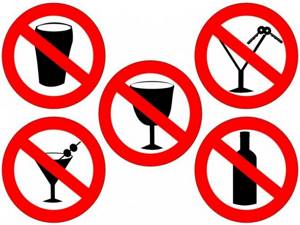
Alcoholic drinks reduce the level of testosterone in the body and also reduce the production of testosterone in the body, which in turn leads to poor muscle growth. Do you remember what I said about muscles?
The lower your testosterone level, the slower your muscles appear.
The less muscle, the slower your metabolism.
The slower your metabolism, the slower your muscle growth and weight loss (the faster you accumulate excess fat).
As for smoking, it affects metabolism exclusively from a negative side, no matter what anyone says, these are drugs, and drugs are not good for the human body, metabolism is crap compared to the harm that absolutely any cigarette carries. In general, on our topic - carbon monoxide and carcinogens suppress cell activity, slowing down metabolism. What are the conclusions? Eliminate bad habits forever!

